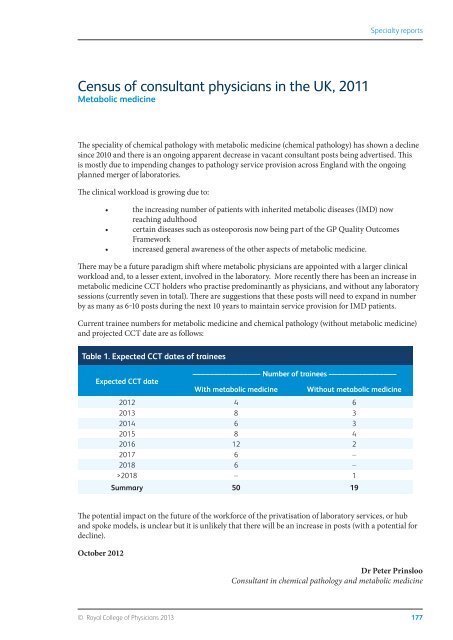Metabolic medicine - Royal College of Physicians
Metabolic medicine - Royal College of Physicians
Metabolic medicine - Royal College of Physicians
Create successful ePaper yourself
Turn your PDF publications into a flip-book with our unique Google optimized e-Paper software.
Specialty reports<br />
Census <strong>of</strong> consultant physicians in the UK, 2011<br />
<strong>Metabolic</strong> <strong>medicine</strong><br />
The speciality <strong>of</strong> chemical pathology with metabolic <strong>medicine</strong> (chemical pathology) has shown a decline<br />
since 2010 and there is an ongoing apparent decrease in vacant consultant posts being advertised. This<br />
is mostly due to impending changes to pathology service provision across England with the ongoing<br />
planned merger <strong>of</strong> laboratories.<br />
The clinical workload is growing due to:<br />
• the increasing number <strong>of</strong> patients with inherited metabolic diseases (IMD) now<br />
reaching adulthood<br />
• certain diseases such as osteoporosis now being part <strong>of</strong> the GP Quality Outcomes<br />
Framework<br />
• increased general awareness <strong>of</strong> the other aspects <strong>of</strong> metabolic <strong>medicine</strong>.<br />
There may be a future paradigm shift where metabolic physicians are appointed with a larger clinical<br />
workload and, to a lesser extent, involved in the laboratory. More recently there has been an increase in<br />
metabolic <strong>medicine</strong> CCT holders who practise predominantly as physicians, and without any laboratory<br />
sessions (currently seven in total). There are suggestions that these posts will need to expand in number<br />
by as many as 6‒10 posts during the next 10 years to maintain service provision for IMD patients.<br />
Current trainee numbers for metabolic <strong>medicine</strong> and chemical pathology (without metabolic <strong>medicine</strong>)<br />
and projected CCT date are as follows:<br />
Table 1. Expected CCT dates <strong>of</strong> trainees<br />
Expected CCT date<br />
‒‒‒‒‒‒‒‒‒‒‒‒‒‒‒‒ Number <strong>of</strong> trainees ‒‒‒‒‒‒‒‒‒‒‒‒‒‒‒‒<br />
With metabolic <strong>medicine</strong><br />
Without metabolic <strong>medicine</strong><br />
2012 4 6<br />
2013 8 3<br />
2014 6 3<br />
2015 8 4<br />
2016 12 2<br />
2017 6 ‒<br />
2018 6 ‒<br />
>2018 ‒ 1<br />
Summary 50 19<br />
The potential impact on the future <strong>of</strong> the workforce <strong>of</strong> the privatisation <strong>of</strong> laboratory services, or hub<br />
and spoke models, is unclear but it is unlikely that there will be an increase in posts (with a potential for<br />
decline).<br />
October 2012<br />
Dr Peter Prinsloo<br />
Consultant in chemical pathology and metabolic <strong>medicine</strong><br />
© <strong>Royal</strong> <strong>College</strong> <strong>of</strong> <strong>Physicians</strong> 2013 177

















